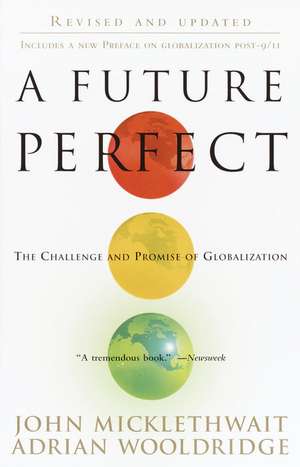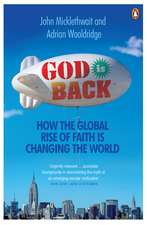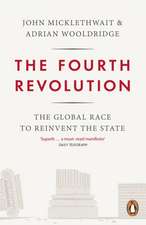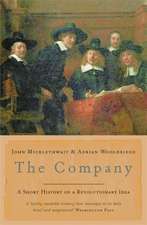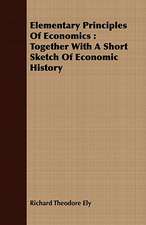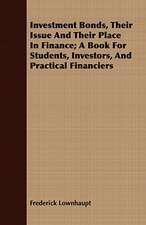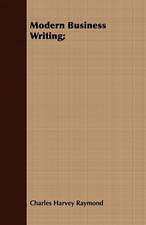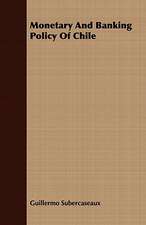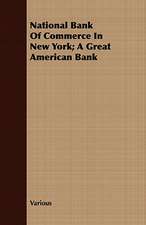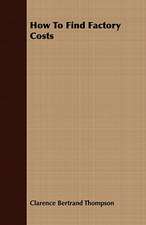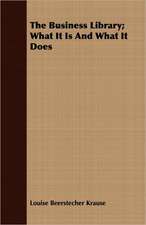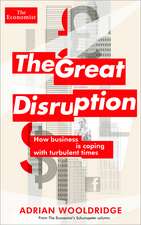A Future Perfect: The Challenge and Promise of Globalization
Autor John Micklethwait, Adrian Wooldridgeen Limba Engleză Paperback – 28 feb 2003
Preț: 134.84 lei
Nou
Puncte Express: 202
Preț estimativ în valută:
25.81€ • 26.84$ • 21.63£
25.81€ • 26.84$ • 21.63£
Carte tipărită la comandă
Livrare economică 13-27 martie
Preluare comenzi: 021 569.72.76
Specificații
ISBN-13: 9780812966800
ISBN-10: 0812966805
Pagini: 416
Dimensiuni: 132 x 207 x 23 mm
Greutate: 0.3 kg
Ediția:Rh Trade PB.
Editura: Random House Trade
ISBN-10: 0812966805
Pagini: 416
Dimensiuni: 132 x 207 x 23 mm
Greutate: 0.3 kg
Ediția:Rh Trade PB.
Editura: Random House Trade
Extras
1
The Fall and Rise of Globalization
In March 1906, a twenty-two-year-old Englishman who was to become one of the titans of the twentieth century took his first foreign holiday unencumbered by his parents. The trip was spent largely in Italy, a country whose food he praised but whose youth he regarded, perhaps hypocritically, as “physically repulsive.” For the young traveler, the journey was a revelation of the joys of globalization. He needed no passport to visit foreign countries, and his gold sovereigns were universally convertible into local currencies at fixed rates of exchange. He found that the world was knit together by railways and steamships and that he could find comfortable hotels wherever he wanted to stay and post offices whenever he wanted to get a message back home.
At the time, Great Britain occupied much the same position in the world that the United States occupies today: that of commercial leviathan, military giant, and cultural arbiter. British goods dominated the world’s markets. British money irrigated the world’s businesses. British military might protected the world’s trading routes. British culture was so powerful that foreigners even took to playing that most idiosyncratic of games, cricket. And most of the world accepted the British gospel of free trade and globalization.
There was no sterner defender of this creed than the young traveler, John Maynard Keynes, one of the most gilded members of one of the most gilded generations in English history. The son of a noted university administrator, he had won scholarships first to Eton and then to King’s College, Cambridge. He had tried, rather precociously, to win a fellowship at King’s soon after graduating, but he had been told to wait.
Yet while Keynes was a child of the establishment, he was certainly not a creature of it. A homosexual in an age when such a trait was not always appreciated, he also belonged to a generation–or rather to a clique within a generation, the Bloomsbury group–that was in more or less open revolt against the certainties of Victorian civilization. As Keynes’s biographer, Robert Skidelsky, records, he spent time with the painter Duncan Grant in Paris on his way to Italy, and then with Lytton Strachey in Genoa, where the two men passed the hours, in Keynes’s words, “eating omelettes and discussing ethics and sodomy.”1 Strachey later wrote the definitive Victorian-bashing book, Eminent Victorians.
You might imagine that Keynes rebelled against Victorian economics as well as Victorian morality. Yet at the time his enthusiasm for free trade was absolute. In his undergraduate days, he spoke out against protectionism in student debates. “I hate all priests and protectionists,” he wrote to a friend, praising “Free Trade and Free Thought.” In fact, free trade was arguably the only political cause that stirred the young Keynes. “We must hold to Free Trade, in its widest interpretation, as an inflexible dogma, to which no exception is admitted,” he thundered. “We should hold to Free Trade as a principle of international morals, and not merely as a doctrine of economic advantage.”2
Three great works helped persuade young men such as Keynes of the virtues of free trade: Adam Smith’s The Wealth of Nations (1776), David Ricardo’s On the Principles of Political Economy and Taxation (1817), and James Mill’s Elements of Political Economy (1821). Smith’s argument that the economy works best when it is left to the “invisible hand” of the market was above all a brief on the virtues of trade: Protectionism is one of the most misguided forms of state intervention. Mill reinforced Smith’s argument by polemicizing against the mercantilist idea (still held widely
today) that only one sort of trade–exports–is good. Mill argued, rather, that the only reason to export something is to get the money to import other things. “The benefit, which is derived from exchanging one commodity for another,” he claimed, “arises in all cases from the commodity received, not the commodity given.”
For his part, Ricardo elaborated the idea of “comparative advantage,” according to which free trade offers all countries, both rich and poor, chances to gain by specializing in what they do best. Sometimes these comparative advantages arise from things as basic as geography or climate (nobody took the British wine industry seriously, even then), but more often they have to do with local skills and productivity. As Ricardo argued, the most productive countries gravitate toward the industries in which they have the greatest advantage, leaving opportunities for others. As long as both the most productive countries and their less-developed peers can trade freely, both gain from this specialization. Globalization arguably comes down to nothing more than allowing this specialization to happen.
To the young Keynes, these were not merely logical arguments; they were the victors in the bloodiest intellectual battle of the previous century. Smith, Mill, and Ricardo had provided the most important battering ram against the protectionist corn laws (which protected farmers by keeping the price of wheat artificially high). That struggle–which had been won only in 1846 after Sir Robert Peel betrayed his own Conservative party and repealed the laws–had inspired people to storm out of dinner parties and even to found magazines. Long after the fuss about the corn laws had died away, internationalism was more than just a way of piling up wealth for the Victorians; it was a moral duty they felt they had to the rest of humanity, a way of spreading the virtues not just of free trade but of free institutions and Christian morality.
From Keynes’s perspective, Britain was the engine of a free-trading system that spanned an ever greater portion of the globe. Several economists have shown recently that the idea that the world economy was “more global” a century ago than it is today is something of a canard. There is far more trade in services today than there was a century ago, far more trade among multinational companies, and far more widely ranging capital markets. But there was nonetheless an impressive degree of integration: The movement of capital and the transfer of profits were largely unhampered; governments exercised little influence over the distribution of wealth; the gold standard provided the entire industrial world and much of the developing world with a friction-free means of exchange. By 1913, the total stock of long-term foreign investment had reached $44 billion, and nearly 60 percent of the securities traded in London were foreign ones.
In one vital way, the world was probably more integrated then than it is today: the movement of people. Citizenship was granted freely to immigrants, and people moved between countries without the bother of a passport, let alone a work permit. America allowed access to anybody who was not a prostitute, a convict, a lunatic, or, after 1882, Chinese. It attracted about two thirds of the thirty-six million people who emigrated from Europe in the fifty years before the First World War, usually searching for cheap land. (Even more people moved from one part of Asia to another, though many of them were indentured workers or coolies.)
There were weeds in this garden, as Keynes well knew. Continental Europe, in general, was much less enthusiastic about free trade than the Anglo-Saxon world was. Between 1875 and 1913, tariffs crept up in most European countries, in part because of the “great grain invasion” from Russia and the United States. Italy, the country that Keynes was visiting, still paid lip service to the economic liberalism laid down by Camillo Benso, conte di Cavour in the 1850s. But ever since a nasty trade war with France in the 1880s, the larghe intese (big interests), particularly those in the steel industry, had developed a taste for the comfortable life that protectionism brought. Further, they came to rely on political influence rather than better products for their success. Meanwhile, animosity against France had led to a general fascination in Italy with all things German and the adoption of cross-shareholdings, often including banks. Protectionist economists were gaining ground at Italian universities: Four years after Keynes’s trip, one of them, Luigi Luzzatti, even became prime minister.
Nor was the Anglo-Saxon world as rock solid as it might have seemed. In America, the campaign against the robber barons, initially inspired by concerns about anticompetitive practices, took on an anticapitalist hue. In Britain, Joseph Chamberlain, one of the most brilliant of the younger generation of Tory politicians, had converted to the idea of “imperial preferences,” favoring goods from the empire (prompting Keynes to inform the Cambridge Union that “conservatism had died and been born again a lower animal”).8 And socialists such as Sidney and Beatrice Webb ridiculed the Victorian ideal of “the Nightwatchman State,” arguing instead that the future lay with rational planning rather than with laissez-faire.
In short, it is not difficult to argue that the elements of the postwar backlash were already in place, but that is only with the benefit of hindsight. For Keynes and his friends, the first decade of the twentieth century was an Indian summer. After Joseph Chamberlain raised the scepter of protectionism in 1903, for example, Keynes’s economics tutor, Alfred Marshall, sent a free-trade manifesto to The Times that declared confidently that no unemployment could result from an increase in imports; to think otherwise was simply to reveal your ignorance of the founding texts of economic science. One of the most influential books of the period was Norman Angell’s The Great Illusion, published in 1911, which came close to arguing (as some American commentators on globalization were wont to do before September 11, 2001) that a major war had become an impossibility, since the world was simply too interdependent.
For Keynes, it was also a time of success. Five years after returning from Italy, he was appointed to a permanent fellowship at his old college. He began to shine not just as an economist but as a government adviser and journalist. In the summer of 1909, he moved into a suite of rooms in Cambridge over the gatehouse leading from King’s Lane to Webb’s Court, rooms that Virginia Woolf regarded as some of the most delightful she had ever seen.
This was the vanished world that Keynes described in his first great work, The Economic Consequences of the Peace. We mentioned it in our introduction, but it is worth quoting in full:
What an extraordinary episode in the economic progress of man that age was which came to an end in August, 1914. . . . The inhabitant of London could order by telephone, sipping his morning tea in bed, the various products of the whole earth, in such quantity as he might see fit, and reasonably expect their early delivery upon his doorstep; he could at the same moment and by the same means adventure his wealth in the natural resources and new enterprises of any quarter of the world, and share, without exertion or even trouble, in their prospective fruits and advantages; or he could decide to couple the security of his fortunes with the good faith of the townspeople of any substantial municipality in any continent that fancy or information might recommend. . . . Most important of all, he regarded this state of affairs as normal, certain, and permanent, except in the direction of further improvement, and any deviation from it as aberrant, scandalous, and avoidable. The projects and politics of militarism and imperialism, of racial and cultural rivalries, of monopolies, restrictions, and exclusion, which were to play the serpent to this paradise, were little more than the amusements of his daily newspaper, and appeared to exercise almost no influence at all on the ordinary course of social and economic life, the internationalization of which was nearly complete in practice.
The Fall and Rise of Globalization
In March 1906, a twenty-two-year-old Englishman who was to become one of the titans of the twentieth century took his first foreign holiday unencumbered by his parents. The trip was spent largely in Italy, a country whose food he praised but whose youth he regarded, perhaps hypocritically, as “physically repulsive.” For the young traveler, the journey was a revelation of the joys of globalization. He needed no passport to visit foreign countries, and his gold sovereigns were universally convertible into local currencies at fixed rates of exchange. He found that the world was knit together by railways and steamships and that he could find comfortable hotels wherever he wanted to stay and post offices whenever he wanted to get a message back home.
At the time, Great Britain occupied much the same position in the world that the United States occupies today: that of commercial leviathan, military giant, and cultural arbiter. British goods dominated the world’s markets. British money irrigated the world’s businesses. British military might protected the world’s trading routes. British culture was so powerful that foreigners even took to playing that most idiosyncratic of games, cricket. And most of the world accepted the British gospel of free trade and globalization.
There was no sterner defender of this creed than the young traveler, John Maynard Keynes, one of the most gilded members of one of the most gilded generations in English history. The son of a noted university administrator, he had won scholarships first to Eton and then to King’s College, Cambridge. He had tried, rather precociously, to win a fellowship at King’s soon after graduating, but he had been told to wait.
Yet while Keynes was a child of the establishment, he was certainly not a creature of it. A homosexual in an age when such a trait was not always appreciated, he also belonged to a generation–or rather to a clique within a generation, the Bloomsbury group–that was in more or less open revolt against the certainties of Victorian civilization. As Keynes’s biographer, Robert Skidelsky, records, he spent time with the painter Duncan Grant in Paris on his way to Italy, and then with Lytton Strachey in Genoa, where the two men passed the hours, in Keynes’s words, “eating omelettes and discussing ethics and sodomy.”1 Strachey later wrote the definitive Victorian-bashing book, Eminent Victorians.
You might imagine that Keynes rebelled against Victorian economics as well as Victorian morality. Yet at the time his enthusiasm for free trade was absolute. In his undergraduate days, he spoke out against protectionism in student debates. “I hate all priests and protectionists,” he wrote to a friend, praising “Free Trade and Free Thought.” In fact, free trade was arguably the only political cause that stirred the young Keynes. “We must hold to Free Trade, in its widest interpretation, as an inflexible dogma, to which no exception is admitted,” he thundered. “We should hold to Free Trade as a principle of international morals, and not merely as a doctrine of economic advantage.”2
Three great works helped persuade young men such as Keynes of the virtues of free trade: Adam Smith’s The Wealth of Nations (1776), David Ricardo’s On the Principles of Political Economy and Taxation (1817), and James Mill’s Elements of Political Economy (1821). Smith’s argument that the economy works best when it is left to the “invisible hand” of the market was above all a brief on the virtues of trade: Protectionism is one of the most misguided forms of state intervention. Mill reinforced Smith’s argument by polemicizing against the mercantilist idea (still held widely
today) that only one sort of trade–exports–is good. Mill argued, rather, that the only reason to export something is to get the money to import other things. “The benefit, which is derived from exchanging one commodity for another,” he claimed, “arises in all cases from the commodity received, not the commodity given.”
For his part, Ricardo elaborated the idea of “comparative advantage,” according to which free trade offers all countries, both rich and poor, chances to gain by specializing in what they do best. Sometimes these comparative advantages arise from things as basic as geography or climate (nobody took the British wine industry seriously, even then), but more often they have to do with local skills and productivity. As Ricardo argued, the most productive countries gravitate toward the industries in which they have the greatest advantage, leaving opportunities for others. As long as both the most productive countries and their less-developed peers can trade freely, both gain from this specialization. Globalization arguably comes down to nothing more than allowing this specialization to happen.
To the young Keynes, these were not merely logical arguments; they were the victors in the bloodiest intellectual battle of the previous century. Smith, Mill, and Ricardo had provided the most important battering ram against the protectionist corn laws (which protected farmers by keeping the price of wheat artificially high). That struggle–which had been won only in 1846 after Sir Robert Peel betrayed his own Conservative party and repealed the laws–had inspired people to storm out of dinner parties and even to found magazines. Long after the fuss about the corn laws had died away, internationalism was more than just a way of piling up wealth for the Victorians; it was a moral duty they felt they had to the rest of humanity, a way of spreading the virtues not just of free trade but of free institutions and Christian morality.
From Keynes’s perspective, Britain was the engine of a free-trading system that spanned an ever greater portion of the globe. Several economists have shown recently that the idea that the world economy was “more global” a century ago than it is today is something of a canard. There is far more trade in services today than there was a century ago, far more trade among multinational companies, and far more widely ranging capital markets. But there was nonetheless an impressive degree of integration: The movement of capital and the transfer of profits were largely unhampered; governments exercised little influence over the distribution of wealth; the gold standard provided the entire industrial world and much of the developing world with a friction-free means of exchange. By 1913, the total stock of long-term foreign investment had reached $44 billion, and nearly 60 percent of the securities traded in London were foreign ones.
In one vital way, the world was probably more integrated then than it is today: the movement of people. Citizenship was granted freely to immigrants, and people moved between countries without the bother of a passport, let alone a work permit. America allowed access to anybody who was not a prostitute, a convict, a lunatic, or, after 1882, Chinese. It attracted about two thirds of the thirty-six million people who emigrated from Europe in the fifty years before the First World War, usually searching for cheap land. (Even more people moved from one part of Asia to another, though many of them were indentured workers or coolies.)
There were weeds in this garden, as Keynes well knew. Continental Europe, in general, was much less enthusiastic about free trade than the Anglo-Saxon world was. Between 1875 and 1913, tariffs crept up in most European countries, in part because of the “great grain invasion” from Russia and the United States. Italy, the country that Keynes was visiting, still paid lip service to the economic liberalism laid down by Camillo Benso, conte di Cavour in the 1850s. But ever since a nasty trade war with France in the 1880s, the larghe intese (big interests), particularly those in the steel industry, had developed a taste for the comfortable life that protectionism brought. Further, they came to rely on political influence rather than better products for their success. Meanwhile, animosity against France had led to a general fascination in Italy with all things German and the adoption of cross-shareholdings, often including banks. Protectionist economists were gaining ground at Italian universities: Four years after Keynes’s trip, one of them, Luigi Luzzatti, even became prime minister.
Nor was the Anglo-Saxon world as rock solid as it might have seemed. In America, the campaign against the robber barons, initially inspired by concerns about anticompetitive practices, took on an anticapitalist hue. In Britain, Joseph Chamberlain, one of the most brilliant of the younger generation of Tory politicians, had converted to the idea of “imperial preferences,” favoring goods from the empire (prompting Keynes to inform the Cambridge Union that “conservatism had died and been born again a lower animal”).8 And socialists such as Sidney and Beatrice Webb ridiculed the Victorian ideal of “the Nightwatchman State,” arguing instead that the future lay with rational planning rather than with laissez-faire.
In short, it is not difficult to argue that the elements of the postwar backlash were already in place, but that is only with the benefit of hindsight. For Keynes and his friends, the first decade of the twentieth century was an Indian summer. After Joseph Chamberlain raised the scepter of protectionism in 1903, for example, Keynes’s economics tutor, Alfred Marshall, sent a free-trade manifesto to The Times that declared confidently that no unemployment could result from an increase in imports; to think otherwise was simply to reveal your ignorance of the founding texts of economic science. One of the most influential books of the period was Norman Angell’s The Great Illusion, published in 1911, which came close to arguing (as some American commentators on globalization were wont to do before September 11, 2001) that a major war had become an impossibility, since the world was simply too interdependent.
For Keynes, it was also a time of success. Five years after returning from Italy, he was appointed to a permanent fellowship at his old college. He began to shine not just as an economist but as a government adviser and journalist. In the summer of 1909, he moved into a suite of rooms in Cambridge over the gatehouse leading from King’s Lane to Webb’s Court, rooms that Virginia Woolf regarded as some of the most delightful she had ever seen.
This was the vanished world that Keynes described in his first great work, The Economic Consequences of the Peace. We mentioned it in our introduction, but it is worth quoting in full:
What an extraordinary episode in the economic progress of man that age was which came to an end in August, 1914. . . . The inhabitant of London could order by telephone, sipping his morning tea in bed, the various products of the whole earth, in such quantity as he might see fit, and reasonably expect their early delivery upon his doorstep; he could at the same moment and by the same means adventure his wealth in the natural resources and new enterprises of any quarter of the world, and share, without exertion or even trouble, in their prospective fruits and advantages; or he could decide to couple the security of his fortunes with the good faith of the townspeople of any substantial municipality in any continent that fancy or information might recommend. . . . Most important of all, he regarded this state of affairs as normal, certain, and permanent, except in the direction of further improvement, and any deviation from it as aberrant, scandalous, and avoidable. The projects and politics of militarism and imperialism, of racial and cultural rivalries, of monopolies, restrictions, and exclusion, which were to play the serpent to this paradise, were little more than the amusements of his daily newspaper, and appeared to exercise almost no influence at all on the ordinary course of social and economic life, the internationalization of which was nearly complete in practice.
Recenzii
“A tremendous book.” —Newsweek
“It is not just that Micklethwait and Wooldridge . . . write gloriously. . . . The book’s substance is what really makes it stand out. . . . Judged in its entirety, with all its ambition and achievement, the book is a spectacular success.” —Foreign Affairs
“[A] compelling, witty discourse . . . To explain how globalization works, and how it came to pass, Micklethwait and Wooldridge take us on an extended world tour.”—Fast Company
“[The authors’] style is familiar to readers of The Economist: smooth, witty, erudite. . . . Their book merits an A.”—USA Today
“It is not just that Micklethwait and Wooldridge . . . write gloriously. . . . The book’s substance is what really makes it stand out. . . . Judged in its entirety, with all its ambition and achievement, the book is a spectacular success.” —Foreign Affairs
“[A] compelling, witty discourse . . . To explain how globalization works, and how it came to pass, Micklethwait and Wooldridge take us on an extended world tour.”—Fast Company
“[The authors’] style is familiar to readers of The Economist: smooth, witty, erudite. . . . Their book merits an A.”—USA Today
Descriere
"A Future Perfect" is the first comprehensive examination of globalization and how it will continue to change lives. The authors analyze, demystify, and expose the global forces reshaping the world, and they detail both the challenge and the promise those forces hold for individuals, businesses, and governments.
Notă biografică
John Micklethwait and Adrian Wooldridge
